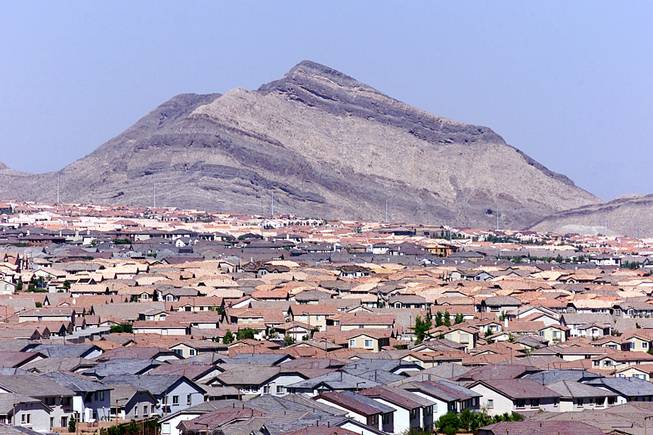
Part of the La Madre Mountains looks down over the sprawling housing growth of Summerlin.
Thursday, Dec. 24, 2009 | 2 a.m.
Sun Archives
- Census: Nevada growth rate down significantly (12-23-2009)
- New method to count population shows Clark County may still be growing (11-14-2009)
- Census Bureau releases data on U.S., Clark County (10-27-2009)
- North Las Vegas among nation’s fastest-growing cities (7-10-2009)
- Demographic changes in Clark County (5-26-2009)
- Nevada falls to No. 8 in population growth (12-22-2008)
- Vacant homes, fewer people. This is Vegas? (11-15-2008)
- Measuring population in moving boxes (8-4-2008)
- Local downturn a hiccup or augur of a bleak future? (7-20-2008)
For two decades Las Vegas boosters had a quick retort to all the nattering naysayers who pointed out the city’s less-than-stellar schools, hospitals and social services: If we’re so bad, why do people keep coming here?
It was never a completely convincing reply, but it contained a morsel of truthiness: Nevada was the country’s fastest growing state through most of the past two decades, more than doubling in size because tens of thousands of people picked up and came here, every year, year after year.
Now, they have stopped coming.
From 2007 to 2008, Nevada recorded its slowest rate of population growth — 1.8 percent — since 1967. From July 2008 to July this year, our growth was barely half that, according to a U.S. Census Bureau estimate released Wednesday.
As of July 1, there were 2.64 million Nevadans, 27,000 more than the year before, an increase of 1 percent, 17th in the nation.
The increase was almost entirely because of the birth rate outpacing the death rate.
Most significantly, Nevada experienced out-migration for the first time in memory — nearly 4,000 more people left Nevada for other states than came here.
Economists and policymakers have been eagerly awaiting the census estimate to determine whether new population would help ease a glut in residential and commercial real estate, and whether Nevadans are leaving the state to find work elsewhere, as now appears likely.
The new numbers contrast strikingly with the rest of this decade when an average of 45,000 people moved here every year from other states.
Analysts both here and nationally cited the weak economy of Nevada and other Sun Belt states, including Florida and Arizona, as the primary cause of the sudden halt in America’s 60-year move to the South and West.
John Restrepo, principal of an economic consulting firm and vice chairman of the Economic Forum, the official fiscal forecasting body for state government, said in an e-mail: “Certainly, the troubles plaguing the state’s job market, particularly in growth-related industries like construction, lodging and hospitality, trade and professional services were the primary contributors.”
He was blunter in a telephone interview: “Why would someone move here? There’s no jobs.”
The data suggest a new era for Nevada’s complicated relationship with its own growth and maturity.
Nevada’s self-image has been bound in the notion of being a vital, growing, booming state, historian Michael Green said. Nevada had become a place where the former denizens of the Rust Belt escaped.
Green said the refrain here has resembled, in slightly altered form, the mantra of Gordon Gekko, the character in the movie “Wall Street”: “Growth is good.”
Bo Bernhard, a UNLV sociologist, said Nevadans should not delude themselves with fanciful notions about why people came here in the first place: “The story of growth here has been the story of people chasing jobs. You don’t move because of a mythology” of a city.
The collapse of growth brings certain consequences.
It has had devastating effects on Nevada’s economy and the fiscal health of state and local governments.
Growth had become a self-perpetuating economic engine, as construction workers who moved here to work on Strip resorts bought new houses built by other construction workers, and so on.
This virtuous cycle has stopped and gone in reverse.
State government, meanwhile, had come to rely heavily on rapid growth and development. The tax structure assumed the boom would continue, delivering more and more money from tourists, gaming companies and construction activity.
Now, state government faces a $2.5 billion budget deficit by early 2011.
Some observers hope the reckoning will provide some hard-won wisdom.
“We built tax policy around the boom. That’s not very smart,” said former Republican state Sen. Warren Hardy, now a lobbyist. “I’m indicting myself because I was part of it — it was an easy thing to do.”
Restrepo said it is time for Nevadans to discover how to create a more sustainable growth pattern with a more diverse economy.
“One of the benefits of the God-awful mess Nevada is in is that our most thoughtful residents now realize that we have to put away our cheerleader outfits and pom-poms, and look at our future realistically. In other words, what do we want to be when we grow up?”
The Census Bureau will conduct its official count of every American in 2010, as mandated by the U.S. Constitution. That count will in turn be used to determine how many congressional seats are awarded to each state.
Nevada had been on a clear trajectory to win another congressional seat, bringing the state’s total to four. David Damore, a UNLV political scientist, said the recent slow growth could put the seat in jeopardy, although Andrew A. Beveridge, a Queens College demographer who has analyzed the data, thinks Nevada is still on track to pick up a seat.
The New York Times contributed to this report.

Join the Discussion:
Check this out for a full explanation of our conversion to the LiveFyre commenting system and instructions on how to sign up for an account.
Full comments policy